Your cart is currently empty!
Tag: Dispose
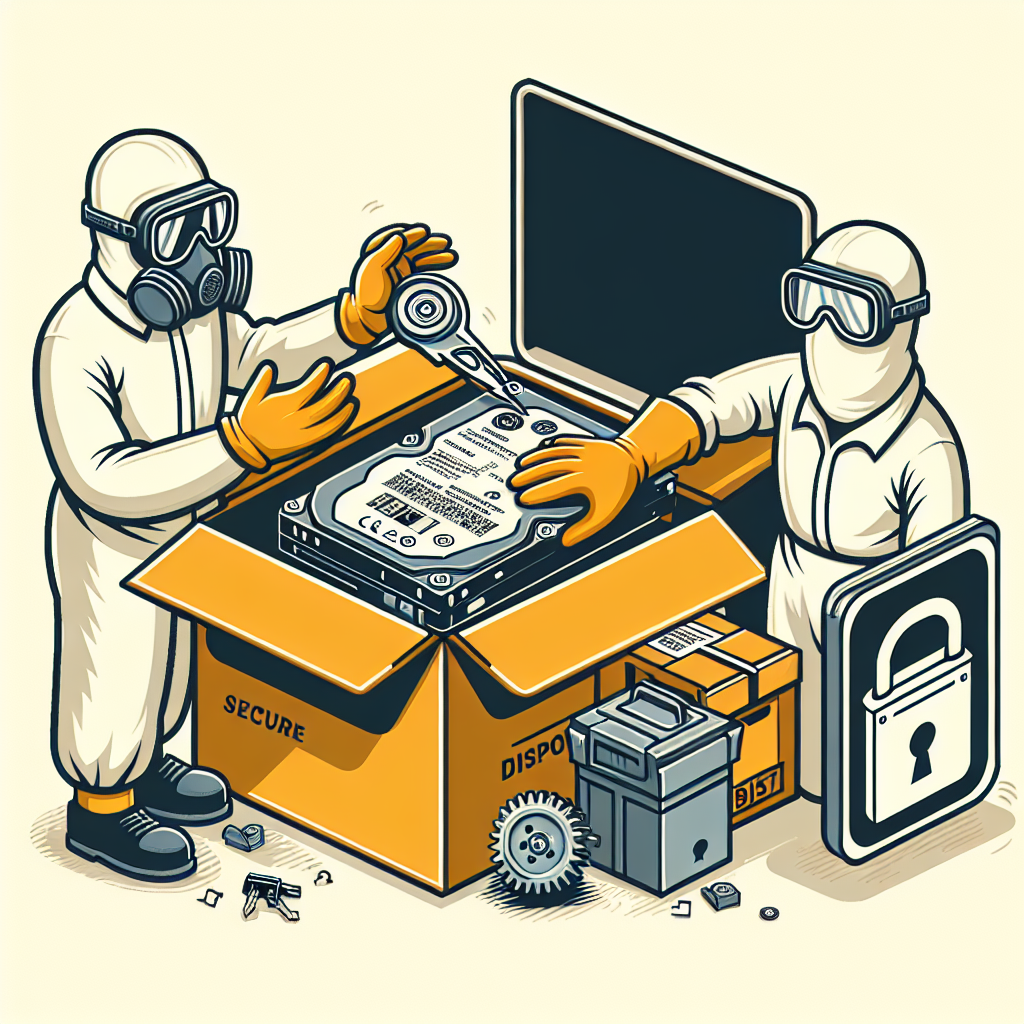
How to Safely and Securely Dispose of an Old Hard Drive
In today’s digital age, the amount of personal and sensitive information stored on our electronic devices is greater than ever before. When it comes time to dispose of an old hard drive, it is crucial to do so in a safe and secure manner to prevent your data from falling into the wrong hands.Here are some tips on how to safely and securely dispose of an old hard drive:
1. Backup your data: Before disposing of your old hard drive, be sure to backup any important files or information that you want to keep. This can be done by transferring the data to a new device or storing it in a secure cloud storage service.
2. Wipe the hard drive: Simply deleting files or formatting the hard drive is not enough to completely erase your data. To ensure that your information cannot be recovered, use a data wiping tool or software to securely erase all data on the hard drive.
3. Physically destroy the hard drive: For added security, physically destroying the hard drive is the most effective way to ensure that your data is unrecoverable. This can be done by drilling holes through the drive, smashing it with a hammer, or using a professional hard drive shredding service.
4. Recycle or dispose of the hard drive properly: Once the hard drive has been wiped or destroyed, it is important to recycle or dispose of it in an environmentally friendly manner. Many electronics recycling centers accept old hard drives and will properly dispose of them in accordance with regulations.
5. Consider using a professional data destruction service: If you have a large number of hard drives or sensitive data that needs to be securely disposed of, consider using a professional data destruction service. These companies specialize in securely wiping and destroying electronic devices to ensure that your data remains safe.
By following these tips, you can safely and securely dispose of your old hard drive without worrying about your personal information falling into the wrong hands. Remember that protecting your data is crucial in today’s digital world, so take the necessary steps to properly dispose of your old electronic devices.
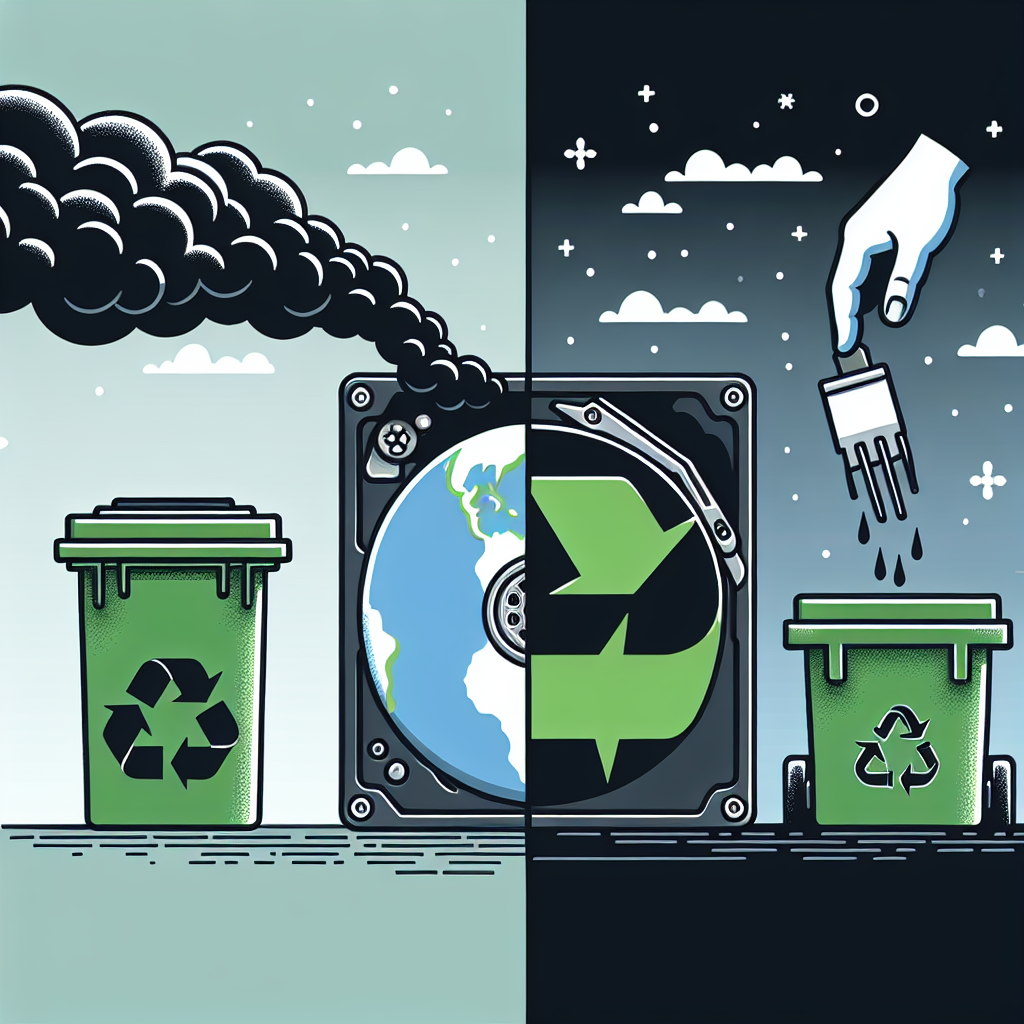
The Environmental Impact of Hard Disk Drives: How to Recycle and Dispose of Them Properly
Hard disk drives (HDDs) are essential components of modern computers, storing all of our important data and files. However, the environmental impact of HDDs can be significant if not disposed of properly. From the materials used to make them to the energy required to manufacture and operate them, HDDs can have a negative impact on the environment if not recycled and disposed of correctly.One of the main environmental concerns with HDDs is the materials used to make them. HDDs contain various metals, such as aluminum, copper, and precious metals like gold and silver. These materials are mined from the earth and can have a significant impact on the environment through deforestation, water pollution, and habitat destruction. Additionally, HDDs contain hazardous materials like lead and mercury, which can be harmful to human health and the environment if not disposed of properly.
Another environmental impact of HDDs is the energy required to manufacture and operate them. The production of HDDs requires a significant amount of energy, contributing to greenhouse gas emissions and climate change. Additionally, HDDs consume electricity while in use, adding to our overall energy consumption and carbon footprint.
To mitigate the environmental impact of HDDs, it is crucial to recycle and dispose of them properly. Recycling HDDs allows for the recovery of valuable materials like metals and reduces the need for new mining and manufacturing. Additionally, recycling prevents hazardous materials from entering the environment and harming ecosystems and human health.
There are several ways to recycle and dispose of HDDs properly. Many electronics retailers and manufacturers offer recycling programs for old HDDs and other electronic waste. These programs ensure that HDDs are recycled in an environmentally responsible manner, with materials recovered and hazardous substances safely disposed of.
Another option is to donate old HDDs to organizations that refurbish and reuse them. By extending the lifespan of HDDs through reuse, we can reduce the demand for new devices and lessen the environmental impact of manufacturing.
Ultimately, it is essential for individuals and organizations to take responsibility for the environmental impact of their HDDs. By recycling and disposing of HDDs properly, we can reduce the strain on natural resources, prevent pollution, and contribute to a more sustainable future.
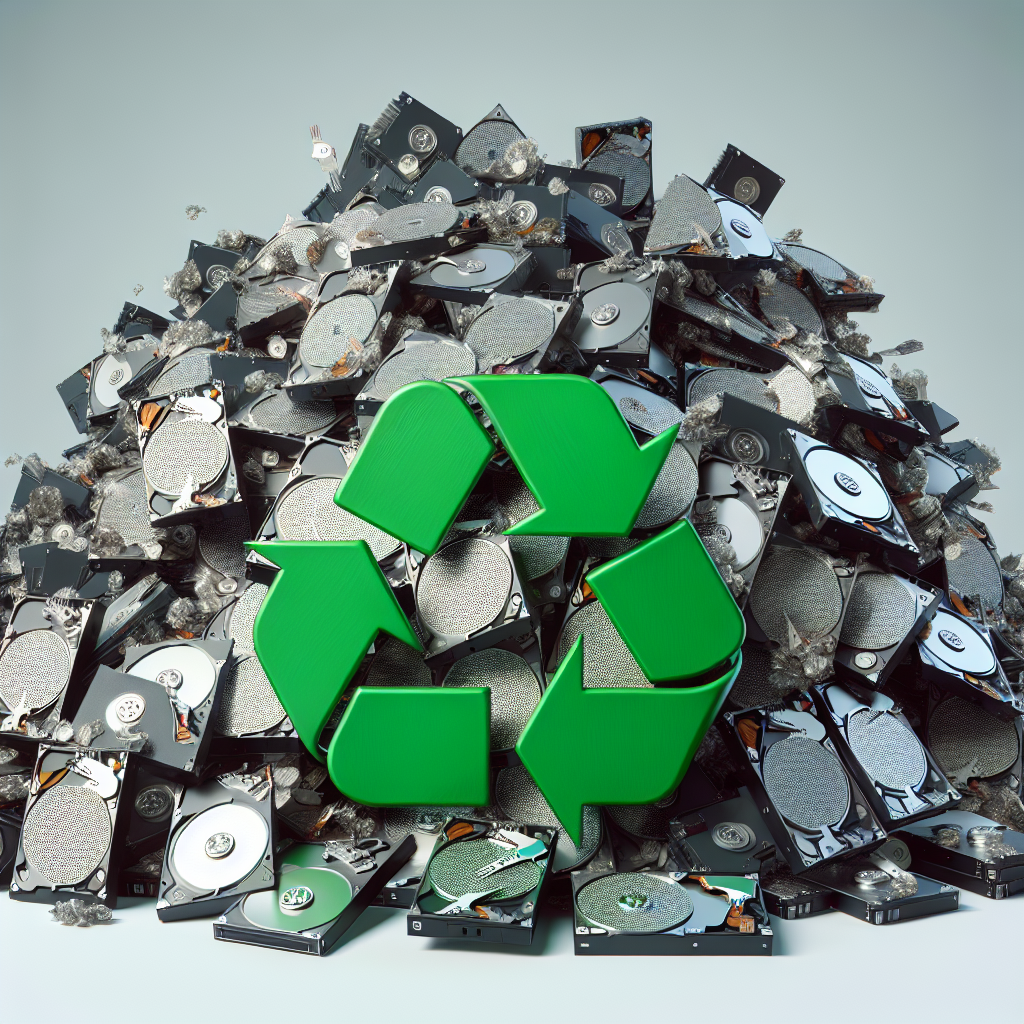
The Environmental Impact of Hard Disk Drives: How to Dispose of Them Responsibly
Hard disk drives (HDDs) are essential components of computers, used for storing and accessing digital information. However, the environmental impact of these devices can be significant if not disposed of properly. With millions of HDDs being replaced each year due to technological advancements, it is crucial to understand how to dispose of them responsibly to minimize their impact on the environment.One of the primary environmental concerns associated with HDDs is the presence of toxic materials such as lead, mercury, and cadmium. These substances can leach into the soil and water if not properly disposed of, posing a threat to human health and the ecosystem. Additionally, HDDs contain valuable materials such as aluminum, copper, and gold, which could be recycled to reduce the need for mining and production of new materials.
To dispose of HDDs responsibly, there are several options available. One option is to donate or sell the device if it is still functioning. Many organizations accept used computers and components for refurbishment or recycling. This not only extends the lifespan of the device but also reduces electronic waste.
If the HDD is no longer functional, it is important to recycle it through a certified e-waste recycling facility. These facilities have the expertise and equipment to safely dismantle and dispose of electronic components, ensuring that toxic materials are properly handled and valuable materials are recovered for reuse. Some manufacturers and retailers also offer take-back programs for electronic devices, making it easier for consumers to recycle their old HDDs.
Another option for disposing of HDDs responsibly is to participate in electronic waste collection events or programs in your community. Many municipalities offer drop-off locations or collection events for electronic waste, allowing residents to safely dispose of their old devices. By participating in these programs, you can ensure that your HDDs are recycled in an environmentally friendly manner.
In conclusion, the environmental impact of hard disk drives can be significant if not disposed of responsibly. By donating, recycling, or participating in e-waste collection programs, you can help reduce electronic waste and minimize the environmental impact of HDDs. It is important for individuals and businesses to take proactive steps to dispose of their electronic devices in a responsible manner to protect the environment for future generations.
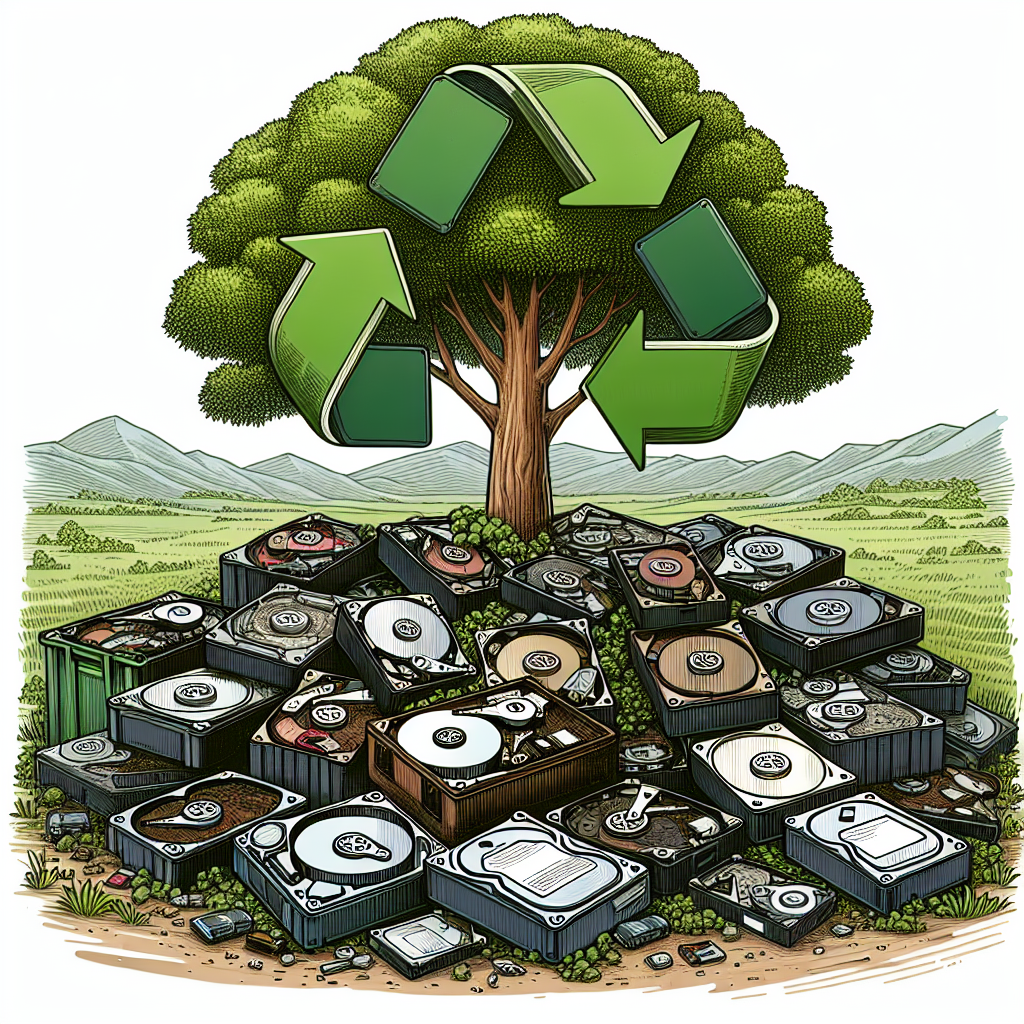
The Environmental Impact of Hard Drives: How to Recycle and Dispose of Them Responsibly
Hard drives are an essential component of modern technology, used in everything from computers to servers to external storage devices. However, the production and disposal of hard drives can have a significant impact on the environment. From the mining of raw materials to the energy used during manufacturing, hard drives contribute to carbon emissions, water pollution, and e-waste accumulation.The mining of materials such as aluminum, copper, and rare earth metals for hard drive production can result in habitat destruction, soil erosion, and water contamination. Additionally, the manufacturing process requires large amounts of energy, contributing to greenhouse gas emissions and climate change. Once a hard drive reaches the end of its life cycle, improper disposal can lead to toxic substances leaching into the soil and water supply.
To mitigate the environmental impact of hard drives, it is important to recycle and dispose of them responsibly. Here are some ways to do so:
1. Recycle through a certified e-waste recycling facility: Many cities and towns have e-waste recycling programs that accept old hard drives and other electronic devices. These facilities are equipped to safely dismantle and recycle the components of the hard drive, ensuring that toxic materials are properly disposed of and valuable metals are recovered for reuse.
2. Donate or resell working hard drives: If your hard drive is still functional, consider donating it to a local charity or school, or selling it to a second-hand electronics store. This extends the life of the hard drive and reduces the demand for new ones to be manufactured.
3. Use a data destruction service: Before recycling or disposing of a hard drive, it is important to ensure that all sensitive data has been securely erased. Many e-waste recycling facilities offer data destruction services that use specialized software or physical destruction methods to ensure that data cannot be recovered.
4. Participate in manufacturer take-back programs: Some hard drive manufacturers offer take-back programs where they will recycle old hard drives for free or for a small fee. Check with the manufacturer of your hard drive to see if they offer this service.
By taking these steps to recycle and dispose of hard drives responsibly, you can help reduce the environmental impact of these essential pieces of technology. By choosing to recycle instead of throwing them away, you are not only protecting the environment but also conserving valuable resources for future generations.
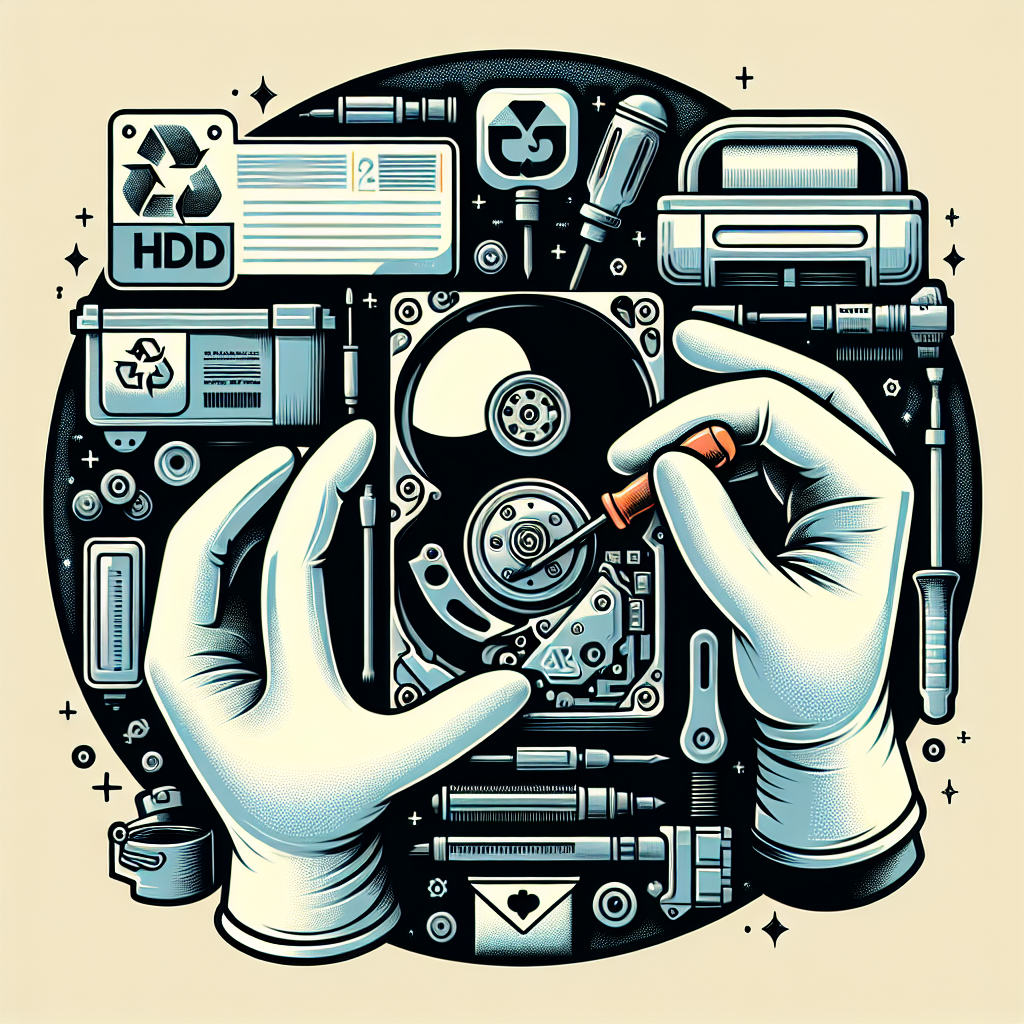
How to Safely and Securely Dispose of an Old HDD
If you’re looking to upgrade your computer or simply need to get rid of an old hard disk drive (HDD), it’s important to dispose of it safely and securely. HDDs contain sensitive data that, if not properly erased, could potentially be accessed by unauthorized individuals. To ensure that your personal information remains private, follow these steps to safely and securely dispose of your old HDD.1. Back up your data: Before disposing of your old HDD, make sure to back up any important data that you want to keep. You can transfer your files to an external hard drive, cloud storage, or another computer to ensure that you don’t lose any valuable information.
2. Erase the data: Once you’ve backed up your data, it’s important to securely erase all the information on your old HDD. Simply deleting files or formatting the drive may not completely remove your data, as it can still be recovered using specialized software. To securely erase your data, you can use a disk wiping tool such as DBAN (Darik’s Boot and Nuke) or a data erasing software recommended by the HDD manufacturer.
3. Physically destroy the HDD: If you want to ensure that your data is completely irretrievable, you can physically destroy the HDD. You can do this by drilling a hole through the drive, smashing it with a hammer, or using a degausser to completely erase the magnetic data on the disk. Be sure to wear protective gear when physically destroying the HDD to prevent injury.
4. Dispose of the HDD responsibly: Once you have securely erased or destroyed the HDD, it’s important to dispose of it responsibly. Do not simply throw it in the trash, as this can harm the environment and potentially expose your data to theft. Instead, consider recycling the HDD at a certified e-waste recycling facility or returning it to the manufacturer for proper disposal.
By following these steps, you can safely and securely dispose of your old HDD while protecting your personal information from unauthorized access. Remember to always back up your data, securely erase or destroy the HDD, and dispose of it responsibly to ensure that your information remains private.
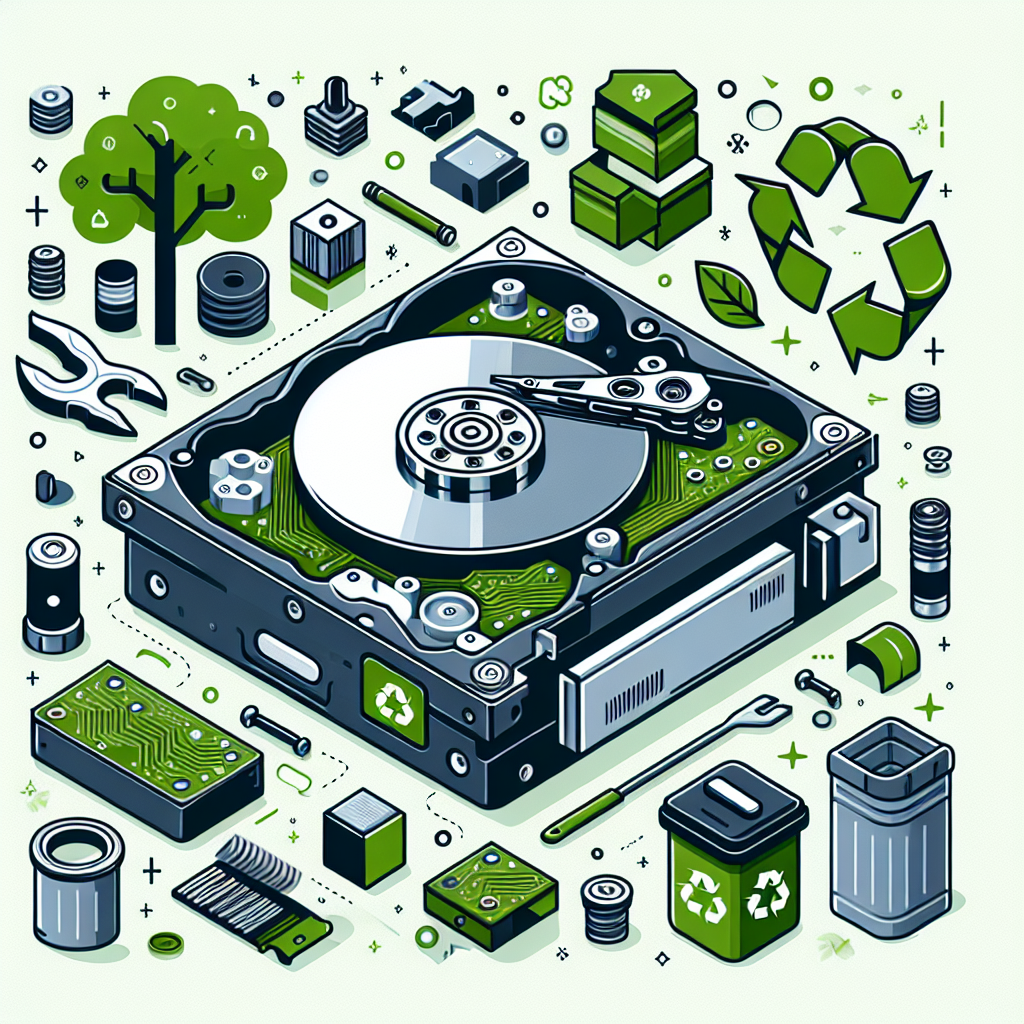
The Environmental Impact of Hard Disk Drives: How to Recycle and Dispose of Old Drives Responsibly
Hard disk drives (HDDs) are essential components of computers and store vast amounts of data. However, the production and disposal of HDDs can have a significant impact on the environment. From the extraction of raw materials to the manufacturing process and finally to the disposal of old drives, HDDs contribute to pollution, resource depletion, and electronic waste.One of the main environmental concerns associated with HDDs is the extraction and processing of raw materials. The manufacturing of HDDs requires the use of materials such as aluminum, copper, and rare earth metals. The extraction of these materials can lead to deforestation, water pollution, and habitat destruction. Additionally, the manufacturing process itself produces greenhouse gas emissions and other pollutants that contribute to climate change and air pollution.
Another environmental issue related to HDDs is electronic waste (e-waste). As technology advances and consumers upgrade their devices more frequently, the amount of e-waste generated is increasing rapidly. When old HDDs are not disposed of properly, they can end up in landfills where toxic chemicals from the electronic components can leach into the soil and water, contaminating the environment and posing a threat to human health.
To mitigate the environmental impact of HDDs, it is important to recycle and dispose of old drives responsibly. Recycling old HDDs allows for the recovery of valuable materials such as metals and plastics, reducing the need for new resources to be extracted. Additionally, recycling helps to prevent e-waste from ending up in landfills and reduces the pollution and greenhouse gas emissions associated with the disposal of electronic devices.
There are several ways to recycle old HDDs. Many electronic retailers and manufacturers offer recycling programs where consumers can drop off their old devices for proper disposal. Additionally, there are third-party recycling centers and e-waste collection events where old HDDs can be recycled. Some organizations also offer data destruction services to ensure that sensitive information stored on the drives is securely erased before recycling.
In addition to recycling, another option for disposing of old HDDs responsibly is to donate them to organizations in need. Many non-profit organizations, schools, and community centers accept donations of old computers and electronic devices to refurbish and redistribute to those who may not have access to technology.
In conclusion, the environmental impact of HDDs is significant, but by recycling and disposing of old drives responsibly, we can help reduce the negative effects on the environment. By choosing to recycle old HDDs, we can conserve resources, reduce e-waste, and minimize pollution. It is important for individuals and businesses to take action and make responsible choices when it comes to the disposal of electronic devices to protect the environment for future generations.
